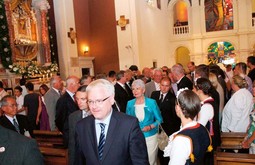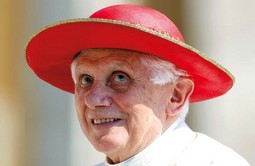Published in Nacional number 770, 2010-08-17
Croatian President's conciliatory policy
Josipovic off to Rome to meet with Benedict XVI
Since taking office the Croatian president has expressed his respect both towards members of the Catholic Church and towards the role it plays in society, and the culmination of his efforts will be a visit to the Vatican in October
 AT THE SHRINE OF OUR LADY Croatian President Ivo Josipovic and Prime Minister Jadranka Kosor at the church of Our Lady of Sinj during the Alka ring tournamentCroatian President Ivo Josipovic plans to visit the Vatican in October to meet with Pope Benedict XVI. Final arrangements are ongoing for a state visit that has much more on the agenda than just a bilateral exchange - according to the information confirmed for Nacional by the Office of the President, Josipovic's visit to the Holy See should mark an important step in the direction of normalising relations with the Roman Catholic Church. The entire itinerary of the meeting between Ivo Josipovic and the Pope is still a matter of secrecy, and the President's Office is not overly disposed to discussing the details. But the matter is nevertheless quite clear - a trip to the Vatican by a president the church vehemently attacked during the election campaign because he is a declared agnostic will mark the culmination of his months of campaigning aimed at patching things up with local bishops and with the lower ranks of the clergy. Josipovic is well aware that as many as 88 percent of Croatian citizens declared themselves to be Catholics during the last census, and with the visit to Benedict XVI he wants to show that he respects the religious orientation of the majority of Croatians, and the broader role played in society by the Catholic Church.
AT THE SHRINE OF OUR LADY Croatian President Ivo Josipovic and Prime Minister Jadranka Kosor at the church of Our Lady of Sinj during the Alka ring tournamentCroatian President Ivo Josipovic plans to visit the Vatican in October to meet with Pope Benedict XVI. Final arrangements are ongoing for a state visit that has much more on the agenda than just a bilateral exchange - according to the information confirmed for Nacional by the Office of the President, Josipovic's visit to the Holy See should mark an important step in the direction of normalising relations with the Roman Catholic Church. The entire itinerary of the meeting between Ivo Josipovic and the Pope is still a matter of secrecy, and the President's Office is not overly disposed to discussing the details. But the matter is nevertheless quite clear - a trip to the Vatican by a president the church vehemently attacked during the election campaign because he is a declared agnostic will mark the culmination of his months of campaigning aimed at patching things up with local bishops and with the lower ranks of the clergy. Josipovic is well aware that as many as 88 percent of Croatian citizens declared themselves to be Catholics during the last census, and with the visit to Benedict XVI he wants to show that he respects the religious orientation of the majority of Croatians, and the broader role played in society by the Catholic Church.
"The visit aims to demonstrate respect towards believers, although we need not forget that the majority of them also voted for Josipovic at the last elections. In doing so they showed that they were not bothered by the fact that he is not religious and, on the other hand, from the start of his term in office he has adopted a very conciliatory attitude towards the Catholic Church and on several occasions endeavoured to demonstrate that he respects the institution and is open to cooperation," explains a close aid to President Josipovic. The idea of a meeting with the Pope has been on the agenda of the president's advisors for some time now. It was, however, on the backburner up to now because Josipovic had decided to focus his efforts during the first months of his mandate on stabilising relations with neighbouring countries. He has been successful in part, especially when it comes to cooperation with Serbian President Boris Tadic, and back in April he had a very good appearance in Sarajevo where he apologised for the crimes Croatians had committed during the war in Bosnia-Herzegovina.
After the negotiations were unblocked, relations with Slovenia also improved, and Josipovic has met with Danilo Turk on several occasions and proved himself an advocate of cooperation between Zagreb and Ljubljana. At the same time the president, during trips across Croatia and abroad, made increasingly frequent appearances at masses and visits to churches. On Statehood Day, 25 June, Josipovic joined Prime Minister Jadranka Kosor at a mass led at Zagreb's Church of St. Mark by Cardinal Josip Bozanic. Josipovic and Jadranka Kosor were together at a mass in Knin on Homeland Thanksgiving Day. And while his aids pointed out that the president was not participating in religious ceremonies, and did not make the sign of the cross, Josipovic did nevertheless go to church. He also visited the nunnery in Zaostrog, the Franciscans on the island of Visovac and the Church of Our Lady of Sinj. Those who took part say that there was a very pleasant atmosphere at these meetings.
His hosts from the ranks of the Church never broached the issue of Josipovic's religious scepticism, and he always toured the monasteries and churches with interest. He also visited a Catholic monastery near Derventa, and when he paid his respects in Bleiburg this May to the victims of the massacre committed by Partisans at the end of World War II, he arrived in the company of Don Ante Kutlesa, a priest and the director for Croatian pastoral missions abroad. He was prepared to accept the invitation of the head of the military ordinariate, Juraj Jezerinac, to join a mass on the occasion of Homeland Thanksgiving Day, but since he had already agreed to be in Knin, he was represented by Danica Juricic-Spasovic, his chief of staff.
Now, in a way, the time has come when Ivo Josipovic plans to take a more prominent role in some socio-political issues, and one of the leading issues is the relationship with the Catholic Church. It could be said that there are at least two reasons why he has judged that this needs to be done. First, the Church continues to have a strong influence on a large portion of the population, and on political parties in Croatia, and second, during the presidential elections the majority of the priesthood was opposed to Ivo Josipovic, and the chief reason was that he was not a Catholic, but rather agnostic. And while Josipovic has on a number of occasions expressed his respect for Catholic tradition, and explicitly rejected proposals to eliminate all religious symbols from public areas such as hospitals, schools and government offices, in many churches priests called on believers to vote for Milan Bandic, and depicted the current president as a godless man.
 POPE BENEDICT XVI will receive Ivo Josipovic on a state visitBishop of Hvar Slobodan Stambuk said that a Croatian president ought to be a Catholic, and Don Vinko Sanader called on those gathered for a sermon delivered ahead of the runoff elections to "not vote for Lucifer," alluding to Josipovic. At the same time some Franciscan priests in Sinj, Livno and other places in the Dalmatia region campaigned for Bandic during mass, just as some diocesan priests did in Zagreb and Petrinja. And while well-known theologians like Adalbert Rebic pointed out that it was religiously and constitutionally unsustainable to propose that the president of the country should be a Catholic, it was evident that the majority of the Church did not accept Ivo Josipovic. Conservative groups within the Church were very loath to accept the outcome of the elections, and, as usually, the Catholic weekly Glas Koncila was most prominent in this regard.
POPE BENEDICT XVI will receive Ivo Josipovic on a state visitBishop of Hvar Slobodan Stambuk said that a Croatian president ought to be a Catholic, and Don Vinko Sanader called on those gathered for a sermon delivered ahead of the runoff elections to "not vote for Lucifer," alluding to Josipovic. At the same time some Franciscan priests in Sinj, Livno and other places in the Dalmatia region campaigned for Bandic during mass, just as some diocesan priests did in Zagreb and Petrinja. And while well-known theologians like Adalbert Rebic pointed out that it was religiously and constitutionally unsustainable to propose that the president of the country should be a Catholic, it was evident that the majority of the Church did not accept Ivo Josipovic. Conservative groups within the Church were very loath to accept the outcome of the elections, and, as usually, the Catholic weekly Glas Koncila was most prominent in this regard.
In his editorial the weekly's chief editor Ivan Miklenic warned that the election of Ivo Josipovic did not represent any kind of democratic breakthrough for Croatia but was rather a "confirmation of the continuity of the political environment" in which his predecessor operated, and that this suited "some of the most powerful political forces." Miklenic, of course, did not offer any arguments to explain who these "most powerful political forces" were, much less to present concrete examples that would support his theories. In spite of the negative experiences during the campaign (which he took quite emotionally), Josipovic decided not to react the criticism from the Church and to lead a conciliatory policy. Relations were, besides, a predetermined certainty - he would assume a five year term in office as president to which he was elected with a convincing, almost two-thirds, majority, and the Catholic Church also has a quite manifest position, and a conflict between them would lead to a new polarisation among the citizenry in a contest that could not produce a winner. Soon the Catholic Church also began to slowly back down, evident from restrained but positive statements from bishops. The new president was congratulated on his election by the president of the Conference of Croatian Bishops, Marin Srakic.
Related articles
Pahor on the Brijuni islands, Josipovic at his summer house in Baska Voda
After the recent visit of the family of Serbian President Boris Tadic, Slovenian Prime Minister Borut Pahor has also decided to spend a part of his… Više
Latest news
-
28.10.2010. / 14:15
'A profitable INA is in everyone's interest'
-
28.10.2010. / 09:38
Sanader’s eight fear SDP — Won’t bring down Government
-
21.10.2010. / 15:02
Interior Ministry turned a blind eye on Pukanic assassination
-
20.10.2010. / 09:34
Barisic could bankrupt HDZ




